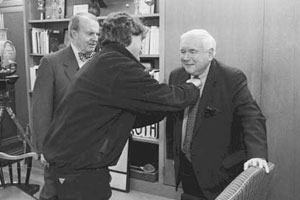 |
|
||
|
|||
![]()
CBS News Sunday Morning: The trove of treasures at Special Collections
|
|
|
| CBS News Sunday Morning anchor Charles Osgood (left) interviews Special Collections Director Howard Gotlieb (right) for a segment that aired on January 19. Photo by Fred Sway |
|
When most of us clean out our desks, closets, and attics, we usually toss what we don’t want in the trash, says Charles Osgood on the January 19 edition of CBS News Sunday Morning. Unless, he adds, you’re one of a select group of people, in which case you send your things to the home base of “a certain very busy archivist” at Mugar Memorial Library at Boston University. That very busy archivist is Howard Gotlieb, director of Special Collections, who joined the University in 1963 with the challenge of building a 20th-century archive of documents, memorabilia, and books chronicling the lives and careers of important writers, artists, performers, and public figures. Angela Lansbury, who was approached by Gotlieb for her memorabilia after her performance in the devilish comedy Sweeney Todd, says of Gotlieb, “He was very persistent, but in a very charming and careful way. He is a diplomat of the first order. He made one feel that everything that had ever been written about one or any kind of memorabilia of your life would be enormously important to the library.” Gotlieb told Osgood that “talent and energy” are his criteria for selecting potential contributors to the archive -- those who have had “this guiding light of their own belief in themselves.” Gotlieb admits that Gloria Swanson was someone he courted quite rigorously for her memorabilia. When she later let her papers go to another university, he asked her why. “They loved me more than you did,” was her reply. “They bought them.”
![]()
New York Times: Double the tax, lower the income
A recent study by Laurence Kotlikoff, a CAS professor and chairman of the economics department, has calculated individuals’ lifetime average tax rates, taking into account not just government taxes, but also entitlement programs such as Medicare and food stamps. “It doesn’t take a lot of income to start paying a lot of taxes,” he says in the January 21 New York Times. Over their lifetimes, “the super poor don’t pay taxes, but the poor do, and certainly the middle class does.” For a couple who earn the minimum wage, Kotlikoff calculated a lifetime negative tax rate, or subsidy, of 32 percent. But the rate becomes positive -- at 30 percent -- for couples earning just three times the minimum wage. For families with the highest income, the tax rate reaches about 50 percent.
![]()
Star Tribune (Minnesota): Backyard skating rinks bring people together
Frozen ponds and backyard skating rinks are a Minnesota tradition, says the January 19 Star Tribune in an article that focuses on how to build and enjoy a backyard rink. Internet sites and chat rooms can be used as sources, as well as trial and error, but most important, rink-builders need to learn about the fundamental law of hydrodynamics. The article quotes from Home Ice: Reflections on Backyard Rinks and Frozen Ponds, by Jack Falla, a COM adjunct professor of journalism, who with the book became the unofficial backyard rink-building authority: “Water seeking its own level will always find it in your neighbor’s yard.” While many backyard rink builders use snowblowers and pickup plows to clear snow from the ice, Falla and other backyard hockey purists believe shoveling reveals the true nature of the rink’s players and symbolically makes the ice new again.
![]()
Boston Globe: Menino backs BUMC biosafety lab plan
Boston Mayor Thomas Menino (Hon.’01) enthusiastically backs a proposal by Boston University Medical Center (consisting of the School of Medicine and Boston Medical Center) to build a high-security biodefense laboratory in the heart of the city, reports the January 18 Boston Globe. BUMC will pursue up to $1.6 million in federal grants to construct and operate a Biosafety Level 4 facility -- the most secure category of laboratories that work with some of the deadliest germs and viruses, including anthrax, smallpox, and ebola. “I’m very interested in the proposal and the benefits it could have for our city,” says Menino, but he cautions that hospital and University administrators need to cultivate support for the plan. “If [Boston University Medical Center] could go out there and tell people what the benefits of this are, I think they’ve got a winner. [BUMC] must educate the community; they must be out there in the community, talking to people.” BUMC is currently conducting telephone surveys of people who live near the campus to find out how they feel about the lab, and representatives plan to meet with neighborhood associations. “It’s exceedingly important, because we want the folks in the community to understand what we’re considering,” says Ellen Berlin, BUMC’s director of corporate communications. “We want to hear their concerns.”
![]()
24
January 2003
Boston University
Office of University Relations
